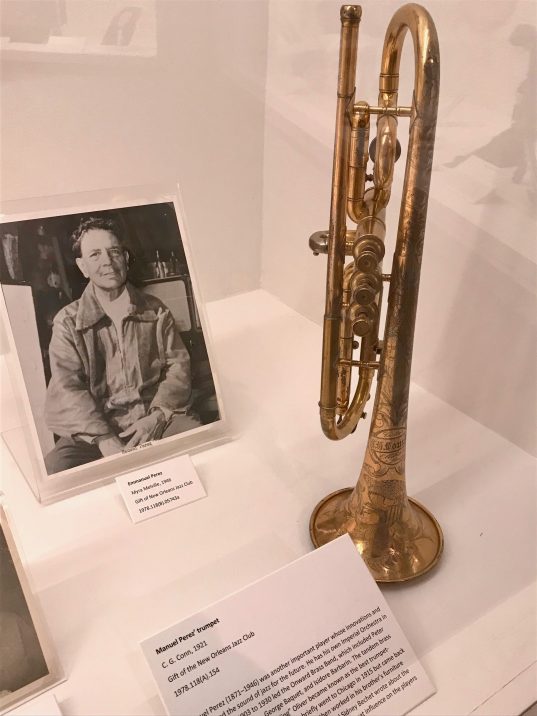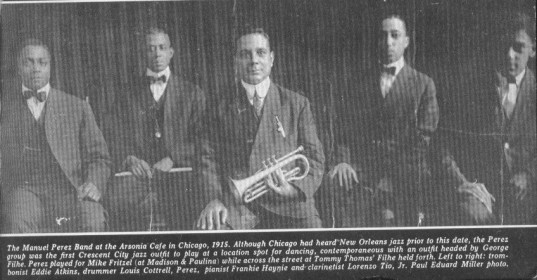Uncle Manuel Perez
When I was a pre-teen, in Catholic grade school, the nun teaching my class sent us home one day with an assignment: to bring in a list of departed relatives who we could pray for. That was the first time I heard the name Manuel Perez.
When I entered high school, and joined my school’s band, we were allowed to select the instrument we wanted to learn and play. I selected a trumpet. When I brought it home that evening, I was greeted by a half befuddled, half amazed look on my father’s face that wondered (as my mother used to say) how strong the genes are. It was then that I learned that Manuel, my father’s uncle, had been a trumpet player.
It was many more years before I learned just how influential a player he had been. Sometime in the 1990’s. I was listening to an NPR 4th of July special on Louis Armstrong when my ears excitedly perked up as I heard “Satchmo” Pops talk about how he followed Manuel Perez and his compatriot, Joe Oliver, around when he was a child. Armstrong is quoted as saying “Emanuel (his given name) couldn’t speak so much English (he spoke French), but his horn would talk ANY language…. I remember as a kid of 10 years old I was so crazy about Perez’s brass band I would follow them on the streets when they paraded with the Elks and Moose and other societies.”
Uncle Manuel – as my brothers and I have come to refer to him, fairly often now, even though he died before any of us were born – was unfortunately never recorded, in spite of the fact that he was quite a popular and influential musician and music teacher in his time.
I came to learn later, through historic documents, that he was educated at a French lycée in New Orleans, and was a trained musician, who could read music, unlike many of the others of his day. He was a regular with the Onward Brass Band, playing funeral and parades, and later formed his own Imperial Brass Band and went on to play regularly at various New Orleans dance halls, the Creole temples of music, playing a bit more “sophisticated” (i.e. European and dance band) music than the newer “hot music” that was becoming popular and was to emerge as what we know now as jazz. There are accounts that he came around and begin to adapt to the “new music”.
He traveled for a short while to play in Chicago, at the urging of Charles Elgar, a New Orleans band leader. They left there famished, according to him – not one of their band had made a nickel (although some dispute that). He reportedly said, “This was my only trip out of New Orleans… it was enough for me! Since then, I have not left the Creole neighborhood!”
By the time students of New Orleans jazz history realized they needed to record these seminal musicians, Uncle Manuel was old and in very poor health, having suffered a a stroke that devastated his speech, memory and ability to play. I’ve heard that he did not want to even speak with them, turning them away. Besides the illness, I suspect there was an attitude of misguided humility, which caused him not to honor his gift and contribution. I also suspect, that in those days before we sang along with James Brown as he proclaimed “say it loud, I’m Black and I’m proud,” and very long before anyone could imagine a bi-racial President of these United States, that he harbored a healthy amount of self-disdain – a legacy of Louisiana’s apartheid-like three tiered color caste system. Being the offspring of a Creole woman of color, and most likely a Spanish, (“perhaps mixed with Indian” the record says) father, my ancestors lived in the insulated world between black and white – often disdaining the African descended part of themselves, as they were taught by the white society who held the power in the culture they lived in, and yet never being accepted as a member of that white society, either. George Lewis, another New Orleans jazz player, is quoted as saying “I heard him (Perez), but never played with him, because there was a prejudice among them people – segregation. Some of those Creole bands wouldn’t hire a man whose hair wasn’t silky. There was one on Robertson Street like that, Jeunes Amis Hall. You wasn’t accepted there. And they would look at you hard if you was playing in that band. I don’t say Manuel Perez ever segregated anybody I know of. But everybody in his band was light-skinned, you know.”
Well, not completely true, perhaps. I was heartened to read another darker skinned musician, Alphonse Picou, being quoted as saying, “At that time they didn’t allow a dark man to come in. If you were dark you had to stay out. I was there, and Manuel Perez liked the way I played High Society and he says, ‘Come on in’ – when a crowd was there – ‘Come on and play High Society,’ and they let me play that solo by myself.” I also read that there was a rivalry between Manuel Perez – the “downtown” player who is said to have personified the Creole wave, and Buddy Bolden, the”uptown” player and sometimes now referred to as the “father of jazz”, who personified the black wave. Jelly Roll Morton (who believed Perez was as good or better than Buddy Bolden), stated “he harbored prejudice against the black musicians”, but he eventually came around to say that he could not deny Bolden’s talent.
When I first moved to New Orleans, I went to the Jazz Museum housed at the old U.S. Mint building to view Uncle Manuel’s trumpet, but learned at the time that it had been in storage since Katrina. This spring I learned that it had been added back into the collection on display, so I finally took myself over there a few days ago, on my birthday, to visit. It was lovely to see the emgraved horn, and a picture of Manuel I had never seen (there are so few) – a picture where, thankfully, he looked happy.

P.S. I know it’s been forever since I have posted. Thanks to the few of you who have told me you’ve missed the posts. I am coming back soon – perhaps with a bit of a different slant – but more about that later.








6 Comments
I love this historical fact and your inspiring recollection & research. Thank you for sharing and posting such a brilliant & beautiful post. I never knew about Manual Perez & our family history regarding music (Jazz)! I remember you & I in the living room at the piano and your Mom playing & singing. Such fond memories.
September 21, 2018
I’m so glad that you now have learned about our great uncle, DeRoy. An important part of our legacy!
October 3, 2018
I love this historical fact and your inspiring recollection & research. Thank you for sharing and posting such a brilliant & beautiful post. I never knew about Manual Perez and our family history regarding music (Jazz)! I remember you & I in the living room at the piano and your Mom playing & singing. Such fond memories.
September 21, 2018
Great article – Manuel Perez is my great grandfather and I’ have followed and read many articles about him .
Thank you
May 4, 2020
I’m creating a website about the old brass bands of New Orleans. And of course mr. Emanuel Perez is one of the musicians I have information about. If you send me an email I would like to share this information, kzbbnodd@xs4all.nl
For example, there’s a firm in New Orleans (https://arthurperezmovers.com/). I think they are directly related to Emanuel Perez, because there’s a picture of him in front of a store with a sign “Let Perez do it” amover firm I think on 2023 St. Antotony Street
https://louisianadigitallibrary.org/islandora/object/lsm-jaz%3A621
https://louisianadigitallibrary.org/islandora/object/lsm-jaz%3A623
A pity that the emailaddress the firm shows on their website don’t work.
November 8, 2022
Thank you for your work!
December 6, 2022